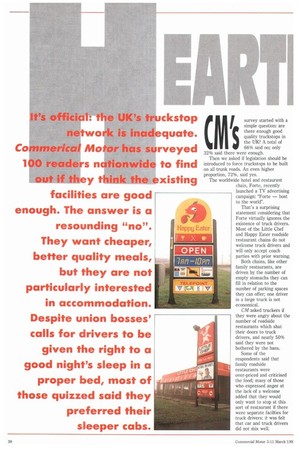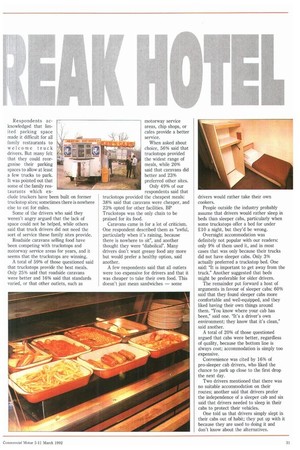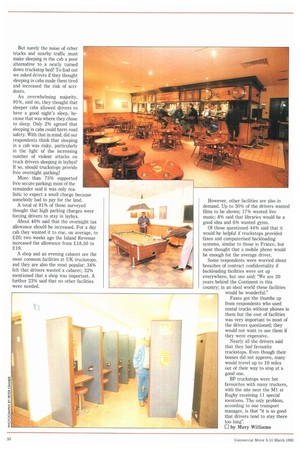survey started with a simple question: are there enough good
Page 32

Page 33

Page 34

If you've noticed an error in this article please click here to report it so we can fix it.
quality truckstops in the UK? A total of 66% said no; only 32% said there were enough.
Then we asked if legislation should be introduced to force truckstops to be built on all trunk roads. An even higher proportion, 72%, said yes.
The worldwide hotel and restaurant chain, Forte, recently launched a TV advertising campaign: "Forte — host to the world".
That's a surprising statement considering that Forte virtually ignores the existence of truck drivers. Most of the Little Chef and Happy Eater roadside restaurant chains do not welcome truck drivers and will only accept coach parties with prior warning.
Both chains, like other family restaurants, are driven by the number of empty stomachs they can fill in relation to the number of parking spaces they can offer; one driver in a large truck is not economical.
CM asked truckers if they were angry about the
number of roadside restaurants which shut their doors to truck drivers, and nearly 50% said they were not bothered by the bans.
Some of the respondents said that family roadside restaurants were over-priced and criticised the food; many of those who expressed anger at the lack of a welcome added that they would only want to stop at this sort of restaurant if there were separate facilties for truck drivers; it was felt that car and truck drivers did not Mix well. Respondents acknowledged that limited parking space made it difficult for all family restaurants to welcome truck drivers. But many felt that they could reorganise their parking spaces to allow at least a few trucks to park. It was pointed out that some of the family restaurants which exclude truckers have been built on former truckstop sites; sometimes there is nowhere else to eat for miles.
Some of the drivers who said they weren't angry argued that the lack of space could not be helped, while others said that truck drivers did not need the sort of service these family sites provide.
Roadside caravans selling food have been competing with truckstops and motorway service areas for years, and it seems that the truckstops are winning.
A total of 59% of those questioned said that truckstops provide the best meals. Only 25% said that roadside caravans were better and 16% said that standards varied, or that other outlets, such as motorway service areas, chip shops, or cafes provide a better service.
When asked about choice, 56% said that truckstops provided the widest range of meals, while 20% said that caravans did better and 23% preferred other sites.
Only 49% of our respondents said that truckstops provided the cheapest meals: 38% said that caravans were cheaper, and 23% opted for other facilities. BP Truckstops was the only chain to be praised for its food.
Caravans came in for a lot of criticism. One respondent described them as "awful, particularly when it's raining, because there is nowhere to sit", and another thought they were "diabolical". Many drivers don't want greasy food any more but would prefer a healthy option, said another.
A few respondents said that all outlets were too expensive for drivers and that it was cheaper to take their own food. This doesn't just mean sandwiches — some drivers would rather take their own cookers.
People outside the industry probably assume that drivers would rather sleep in beds than sleeper cabs, particularly when some truckstops offer a bed for under £10 a night, but they'd be wrong.
Overnight accommodation was definitely not popular with our readers: only 9% of them used it, and in most cases that was only because their trucks did not have sleeper cabs. Only 3% actually preferred a truckstop bed. One said: "It is important to get away from the truck." Another suggested that beds might be preferable for older drivers.
The remainder put forward a host of arguments in favour of sleeper cabs: 60% said that they found sleeper cabs more comfortable and well-equipped, and they liked having their own things around them. "You know where your cab has been," said one. "It's a driver's own environment; they know that it's clean," said another.
A total of 20% of those questioned argued that cabs were better, regardless of quality, because the bottom line is always cost; accommodation is simply too expensive.
Convenience was cited by 16% of pro-sleeper cab drivers, who liked the chance to park up close to the first drop the next day.
Two drivers mentioned that there was no suitable accommodation on their routes; another said that drivers prefer the independence of a sleeper cab and six said that drivers needed to sleep in their cabs to protect their vehicles.
One told us that drivers simply slept in their cabs out of habit; they put up with it because they are used to doing it and don't know about the alternatives. But surely the noise of other trucks and nearby traffic must make sleeping in the cab a poor alternative to a neatly turned down truckstop bed? To find out we asked drivers if they thought sleeping in cabs made them tired and increased the risk of accidents.
An overwhelming majority, 91%, said no, they thought that sleeper cabs allowed drivers to have a good night's sleep, because that was where they chose to sleep. Only 2% agreed that sleeping in cabs could harm road safety. With that in mind, did our respondents think that sleeping in a cab was risky, particularly in the light of the increasing number of violent attacks on truck drivers sleeping in laybys? If so, should truckstops provide free overnight parking?
More than 75% supported free secure parking; most of the remainder said it was only realistic to expect a small charge because somebody had to pay for the land.
A total of 81% of those surveyed thought that high parking charges were forcing drivers to stay in laybys.
About 40% said that the overnight tax allowance should be increased. For a day cab they wanted it to rise, on average, to £20; two weeks ago the Inland Revenue increased the allowance from £18.50 to £19.
A shop and an evening cabaret are the most common facilities at UK truckstops, and they are also the most popular: 34% felt that drivers wanted a cabaret; 32% mentioned that a shop was important. A further 23% said that no other facilities were needed. However, other facilities are also in demand. Up to 30% of the drivers wanted films to be shown; 17% wanted live music; 8% said that libraries would be a good idea and 6% wanted gyms.
Of those questioned 44% said that it would be helpful if truckstops provided faxes and computerised backloading systems, similar to those in France, but most thought that a mobile phone would be enough for the average driver.
Some respondents were worried about breaches of contract confidentiality if backloading facilities were set up everywhere, but one said: We are 20 years behind the Continent in this country; in an ideal world these facilities would be wonderful."
Faxes got the thumbs up from respondents who used rental trucks without phones in them but the cost of facilities was very important to most of the drivers questioned; they would not want to use them if they were expensive.
Nearly all the drivers said that they had favourite truckstops. Even though their bosses did not approve, many would travel up to 10 miles out of their way to stop at a good one.
BP truckstops were hot favourites with many truckers, with the site near the M1 at Rugby receiving 11 special mentions. The only problem, according to one transport manager, is that "it is so good that drivers tend to stay there too long".
C.] by Mary Williams












































































































